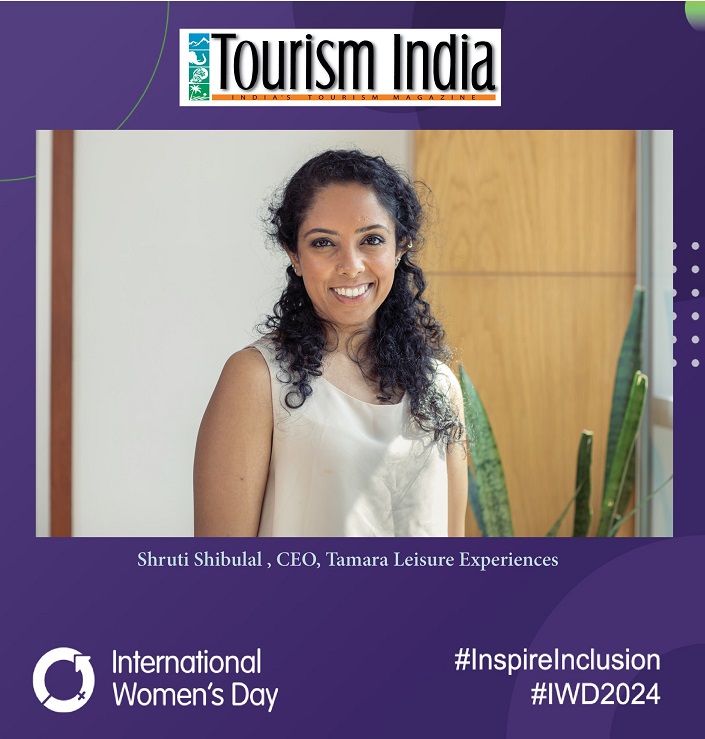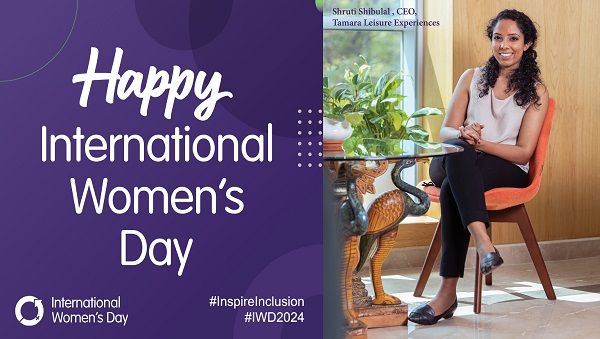In connection with International Women’s Day 2024, Shruti Shibulal, CEO, of Tamara Leisure Experiences, a young and dynamic women hospitality entrepreneur, talked extensively with the Tourism India editorial team on this year’s theme, excerpts from the interaction.


How has being a woman influenced your journey as an entrepreneur in the tourism industry?
As a responsible hospitality group, designing and running Tamara Leisure Experiences has required questioning, revising, or reinventing much of the status quo. When we began assessing how a hotel impacts its surrounding locality – the environment, the job market, small businesses, etc. – it became evident that uplifting women would uplift entire communities and eventually the local economy. I continue to prioritise the importance of education, employment, and empowerment for women, which is not necessarily influenced by being a woman, but rather by knowing that all women are integral to the growth of organisations and the sustainable success of the entire industry.
What challenges have you faced as a woman entrepreneur in the tourism and hospitality sector and how have you overcome them?
Tokenism is an issue we continue to see in the industry. For example, leadership conferences that decree the need for diversity, sometimes display biases within their selection criteria. “A Women’s Entrepreneurship Panel”, for instance, isolates the already small ratio of attending women leaders from a broader (and by default) male-dominated discourse, contradicting true inclusivity.
Tokenism can, of course, exist within an organisation as well. One way to mitigate the pitfalls of this is to create a transparent work environment in which diverse ideas, opinions, and experiences are not only acknowledged but actively shape dialogues and decisions. To achieve this at Tamara, we have developed efficient internal communications systems (including a proprietary messaging app and project management system) that allow us to continuously communicate across ranks, departments, and properties. Our daily operations are bolstered by a collaborative culture that presents opportunities for learning (contributing to career growth and employee satisfaction), documents concerns (in a safe and welcoming forum), and administers well-informed, timely solutions (including those that impact policies to promote greater inclusivity).
In what ways do you believe investing in women within the tourism industry can accelerate progress?
Investing in women, in general, would benefit not only the industries in which they work but also their families, communities, and a much larger social, economic, and cultural radius. As a highly Interactive and dynamic sector that contributes to roughly 10% of the global labour market, the tourism industry, in particular, is very well positioned to proactively lead this momentum.
Gender parity in tourism (as is the benefit of diversity everywhere) can lead to an infusion of fresh perspectives and ideas that are currently missing, especially in higher-ranking positions that continue to be largely male.


The innovation made possible by these ideas would help an already dynamic industry better cater to emerging guest preferences. This is especially important considering that millennials and post-pandemic travellers are a highly informed and conscious cohort. Social responsibility and ethical practices including those that prioritise diversity in the workforce, are no longer just value-adds for the responsible traveller, they are resonant and important policies that influence guest loyalty and recommendations.
Can you share examples of initiatives or strategies you’ve implemented to empower women within your tourism business or community?
There are several policies in place at Tamara that focus on addressing women’s needs. In addition to a strong Anti-Harassment Policy, a well-rounded Maternity Leave benefits package, and regular surveys to ensure pay parity, we focus on hiring local women from economically disadvantaged backgrounds into roles such as gardening, sanitation, and laundry services. These roles allow women with little or no prior training to find gainful employment and gradually progress through the organisation.
We also offer pick-up and drop services to employees, which particularly benefits women, working at our larger, more secluded properties. To foster a supportive work environment for working mothers at our Bangalore head office, we have partnered with a daycare for children aged 6 months to 6 years. To place more women into positions of leadership and bolster career growth for all employees, we set in place The Career Development Plan (CDP) which offers skill enhancement to align promising individuals with emerging opportunities within the organisation.
Our recruitment policies are also continuously improved to encourage more women applicants and we actively monitor to see an increase in representation of women across teams, to have a diverse and balanced team across the company
What advice would you give to aspiring female entrepreneurs looking to enter the tourism industry?
I would encourage all young entrepreneurs to take a very long-term view of their vision. There are many ups and downs along the way. The path is not linear. However, there is a great deal of opportunity embedded in this journey of trial and error. It is important to know that when you are doing something that has not been done, you will be creating opportunities for yourself and others.
What we create must have meaning not only for ourselves but for those around us. If we can hold this value close, we will not only create lucrative enterprises but also ones that hold great social value, enterprises that open doors for other women entrepreneurs.
How do you balance the demands of entrepreneurship with other aspects of your life, such as family or personal interests?
I maintain an organised schedule that allows me to divide my time every day between professional and personal interests and I have an excellent, supportive team to whom I can delegate work as needed. I am also continuously learning both from my personal life and leadership at work. Both sides, while remaining essentially separate, feed into one another through shared experiences.
What opportunities do you see for women in leadership roles within the tourism sector, and how can they be encouraged and supported?
Leading networking groups and mentorship programmes for other promising women professionals in the hospitality industry would benefit both the industry and women in leadership today.
Through alliances – whether affinity groups, grassroots initiatives, or formal mentorship programmes – women can contribute to lasting shifts within their existing organisations; shifts that open doors for future generations of women.
In addition to providing social and professional support, networking communities provide the leverage necessary for women to advocate for particular interests and actionable solutions.
All responsible leaders in the industry, including women, should take on roles of mentorship, design forums for community building, and activate partnerships that create a symbiotic momentum for equitable, safe, inspiring, and inclusive workforces. These initiatives, whether applied within existing organisations or carried out as independent forums, serve to build an ecosystem of collaborative growth that supports existing leaders, helps to position more women in the hospitality sector, and effects incremental change on common practices across the industry.
How do you leverage your unique perspective and experiences as a woman in the tourism industry to drive innovation and growth?
My focus was always to develop a holistically sustainable organisation that would cater very specifically to people – including creating models that would place more women into positions of leadership and also train promising candidates to pursue aspirational positions.
I am the Managing Trustee of a non-profit initiative known as SAATHIYA, which is a hospitality skilling academy. We enroll economically disadvantaged students, often from rural areas, to undergo training that prepares them for jobs in hospitality. Through SAATHIYA, we work with WICCI (Women’s Indian Chamber of Commerce and Industry) to ensure we are increasing the number of women applicants for jobs.
We also facilitate in-house sessions on financial management, some of which cater specifically to women and their particular needs or aspirations. We offer need-based scholarships to the children of employees and interest-free loans on a case-by-case basis. Much of this benefits employees across the board, however, it particularly supports women who are primary care-givers.
Can you share a story or moment that encapsulates the impact of investing in women to accelerate progress within the tourism sector?
This past year has been especially memorable as I had the pleasure of welcoming several women into senior leadership positions. These women have enriched our organisation in invaluable ways and have been a pleasure to work alongside. As we grow our multiple brands this year, I am personally looking forward to discovering new avenues to work with communities of local women. Collaborating with residents, especially women, who have rich knowledge of the land and culture was integral to our business journey, both in The Tamara Resort properties in rural parts of the country, as well as our city-centric hotels – O by Tamara and Lilac.
Also, read
Watch in Youtube
